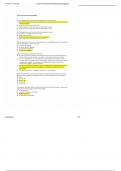11/15/23, 11:34 AM QUIZ 3 Financial Forecasting and Budgeting
Financial Forecasting and Budgeting
Which of the following assumptions is embodied in the AFN equation?
a) Accounts payable and accruals are tied directly to sales, meaning follow the increases or
decreases in sales.
b) None of the firm's ratios will change.
c) Fixed assets, but not current assets, are tied directly to sales.
d) Common stock and long-term debt are tied directly to sales.
The financing decision will consider the following factors, except:
a) Conditions in the debt and equity markets
b) Target capital structure
c) Restrictions imposed by existing purchase agreements
d) Effect of short-term borrowing on its current ratio
When an organization involves its many employees in the budgeting process in a meaningful
way, the organization is said to be using:
a) zero-based budgeting.
b) employee-based budgeting.
c) activity-based budgeting.
d) participative budgeting.
Which of the following statements is incorrect?
a) A typical sales forecast, though concerned with future events, will usually be based on
recent historical trends and events as well as on forecasts of economic prospects.
b) As a firm's sales grow, its current assets also tend to increase. For instance, as sales
increase, the firm's inventories generally increase, and purchases of inventories result in
more accounts payable. Thus, spontaneous liabilities that reduce AFN arise from
transactions brought on by sales increases.
c) Once a firm has defined its purpose, scope, and objectives, it must develop a strategy
for achieving its goals. Corporate strategies are detailed plans rather than broad
approaches.
d) The mission statement is a statement of the firm's overall purpose.
Which of the following choices correctly denotes managerial functions that are commonly
associated with budgeting? (1) Planning, (2) Performance Evaluation, (3) Coordination of
Activities.
a) Yes, No, Yes
b) Yes, Yes, Yes
c) Yes, No, No
d) Yes, Yes, No
In preparation of budget, which committee of the board of directors compiles, reviews and
approves component budgets of the master budget?
a) Audit Committee
b) Corporate Governance Committee
c) Budget Committee
d) Finance Review Committee
about:blank 1/10
, 11/15/23, 11:34 AM QUIZ 3 Financial Forecasting and Budgeting
The master budget contains the following components, among others: (1) production
budget, (2) budgeted balance sheet, (3) sales budget, and (4) cash budget. Which of these
components would be prepared first and which would be prepared last?
a) First, 1 and Last, 2
b) First, 1 and Last, 4
c) First, 3 and Last, 2
d) First, 3 and Last, 4
Which of the following organizations is not likely to use budgets?
a) Manufacturing firms.
b) Firms in service industries.
c) None, all are likely to use budgets.
d) Merchandising firms.
A budget serves as a benchmark against which:
a) allocated results can be compared.
b) actual results can be compared.
c) allocated results become inconsequential.
d) actual results become inconsequential.
The budgeted income statement, budgeted balance sheet, and budgeted statement of cash
flows comprise:
a) the first step of the master budget.
b) the final portion of the master budget.
c) the depiction of an organization's overall actual financial results.
d) the portion of the master budget prepared after the sales forecast and before the
remainder of the operational budgets.
Which of the following statements best describes the relationship between the sales-
forecasting process and the master-budgeting process?
a) The sales forecast is typically completed before the master budget and has no impact on
the master budget.
b) The sales forecast is typically completed before the master budget and has little impact
on the master budget.
c) The sales forecast is typically completed after completion of the master budget.
d) The sales forecast is typically completed before the master budget and has significant
impact on the master budget.
The comprehensive set of budgets that serves as a company's overall financial plan is
commonly known as:
a) a proforma budget.
b) an integrated budget.
c) a financial budget.
d) a master budget.
Generally speaking, budgets are not used to:
a) evaluate performance.
b) assist in the control of profit and operations.
c) identify a company's most profitable products.
d) create a plan of action.
about:blank 2/10




